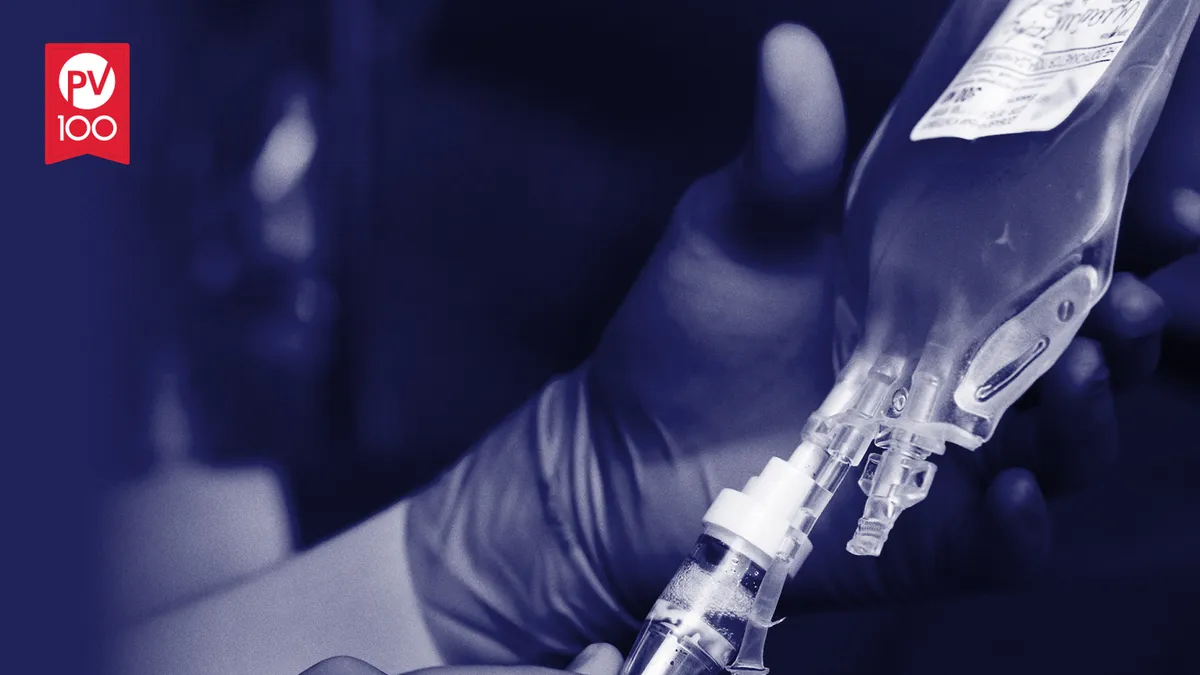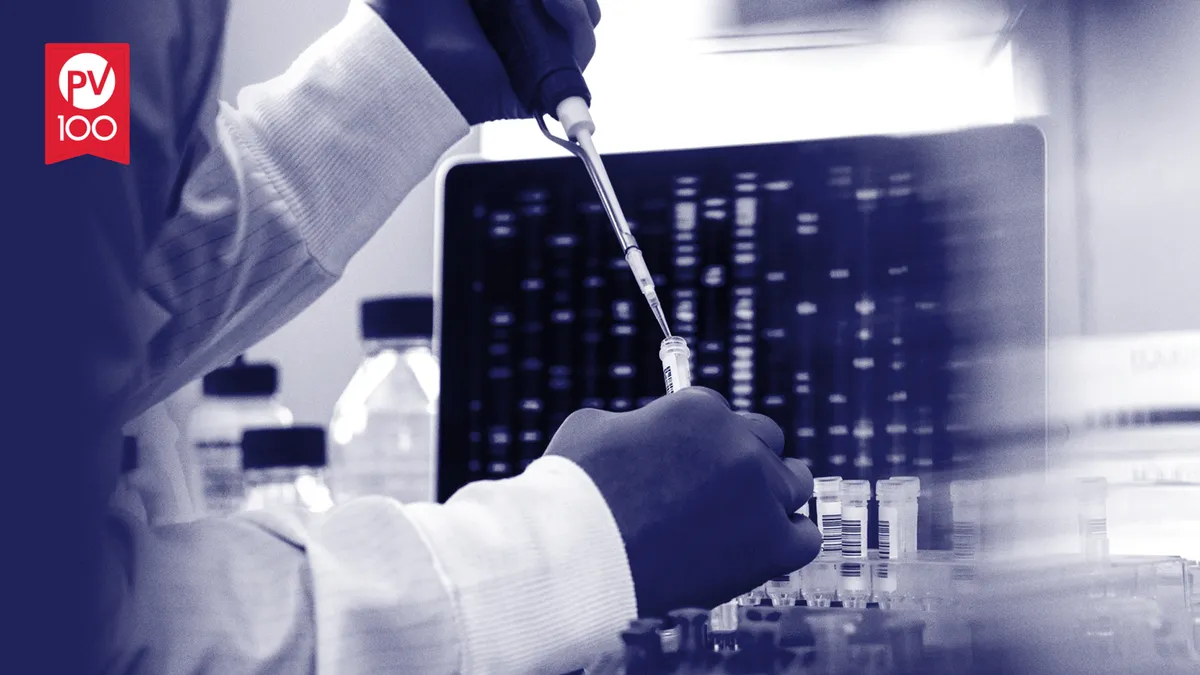Editor’s note: This story is part of our 2022 Red Jacket awards feature.
After finding success in a variety of roles, including advocacy, marketing and sales, Quita Highsmith began her journey into the DE&I arena at Genentech in 2017. Years before she held the official role of chief diversity officer at the company, she was already using her voice to ask bigger questions and challenge systemic inequities.
The game-changing moment for Highsmith came when she was leading the Genentech Alliance and Advocacy Relations team. She said the team was planning an organization-wide patient advocacy summit, and she wanted to include a diverse set of patients who had participated in Genentech's clinical research.
“We could not identify anyone, not one single patient of color,” she said. “Then, I began to ask, ‘Why?’”
The “why” led to her and her colleague Nicole Richie, also a PharmaVoice 100 honoree, to co-found Genentech’s enterprise-wide Advancing Inclusive Research (AIR) initiative to address barriers to clinical research participation faced by underrepresented racial and ethnic groups.
In 2020 Highsmith was named Genentech's chief diversity officer — the first such appointment for the 46-year-old biotech giant.
“Diversity and inclusion is multi-faceted, complex and there are a host of systemic issues — there is no magic solve.”
Quita Highsmith
Vice president and chief diversity officer, Genentech
Since then, Highsmith has charged full speed ahead, transforming the company’s DE&I strategies with transparency, intentionality and bold actions. Instead of making small changes, she has aimed to create transformational and lasting impact, from implementing inclusive hiring practices that aim to eliminate unconscious bias to creating equitable opportunities for career advancement for all employees. Another large focus has been increasing the participation of underrepresented patient populations in clinical research.
Reporting directly to Genentech CEO, Alexander Hardy, Highsmith has provided a tremendous amount of influence in crafting enterprise-wide strategic initiatives to drive business impact that include “investing in commercial efforts, stakeholder engagement, research innovation and community relations.”
When she began her role as chief diversity officer, one of her first steps was to lean in and take an audit of the company’s DE&I practices. The result was identifying three strategic pillars, which provide the framework for the organization’s 2025 DE&I commitments — fostering belonging, advancing inclusive research and health equity, and transforming society — as well as putting metrics into place to measure progress against its commitments. The company published its inaugural D&I Annual Report last year; then followed up with its 2021 Annual Report, highlighting the progress made toward its DE&I pillars and 2025 goals.
So how are Highsmith and her teams doing? In 2021, according to the company, it invested $879 million in diverse supplier partnerships and more than $10.5 million in diversity in STEM initiatives. It also launched a series of Health Equity Symposia across the nation and influenced suppliers to be more inclusive. In fact, close to 90% of its suppliers with RFPs of a half-million dollars or greater have stated commitments to DE&I initiatives.
“We are looking for progress, not perfection,” Highsmith said. “There are no easy solutions when it comes to how to be more inclusive. At Genentech, we believe in a world where all patients have access to the best quality healthcare and a future of science that is more diverse, more inclusive and more equitable.”
As part of the Advancing Inclusive Research and Health Equity pillar commitments, all clinical research teams should “include population-specific assessments and inclusive research action plans,” she said. One of the goals is to ensure that the medicines being investigated and developed reflect the diversity of the patients who could potentially benefit from the treatments.
“Genentech founded the biotech industry, and we believe we have a responsibility to stop blaming patients of color and come up with real solutions to advance inclusive research and health equity,” Highsmith said.
In terms of Genentech’s fostering belonging pillar commitments, Highsmith and her team are also making strides toward doubling Black/African American and Hispanic/Latinx representation of directors and officers and extended leadership, mirroring Asian representation of directors and officers to that of individual contributors and managers/supervisors, and addressing gender representation opportunity zones. In 2021, Genentech made progress in increasing representation of Asian, Black and Hispanic/Latinx employees across all levels of its workforce; with 53% of employees identifying as people of color. Additionally, although 53% of Genentech’s directors and officers identify as women, they are continuing to take a data-driven approach to uncover insights and ensure greater gender representation of women in STEM leadership.
Highsmith has become a role model within the life sciences and is widely recognized for her drive, passion and bold actions to transform the industry. She is a change-maker and a disruptor who encourages her teams to stand up and actively fight for what they believe is right.
In addition to having been named a PharmaVoice 100 honoree on multiple occasions, in 2022, Highsmith was chosen by Savoy Magazine as one of the “Most Influential Black Executives in Corporate America” and selected as an Elite 100 by Diversity Woman’s Magazine. In 2021, she was named the Inspire Award winner by San Francisco Business Times, honored as the Inaugural Visionary Award winner by Women of Color in Pharma (WOCIP) and selected as a top 15 Champion by Diversity Global Magazine.
Highsmith also routinely addresses members of Congress and speaks at national and international forums about Genentech’s blueprint for success as well as the societal issues that are impacting DE&I and health equity.
She noted: “Now is the time for us to be bold, to make change. This has to be more than just a moment, it needs to be an inclusion movement. This is how we truly work to eliminate health inequities so that all people have access to personalized healthcare.”
Highsmith joined Genentech in 2010, and over the course of the past decade she has made a significant impact on the company’s culture beyond her C-suite role. She fervently believes in bringing her authentic self to every situation, and by doing so, she has given “permission” to others to follow suit.
“I believe that some of the greatest minds in this industry are at Genentech working to solve issues to improve patient lives. I have been given a platform to raise my hand and challenge the status quo,” Highsmith said. “I feel this is very important, because if you don’t have a chance to challenge the status quo, and everybody has to act alike, think alike, look alike and be an echo chamber, then you won’t have the best thinking. I appreciate the open-mindedness of the organization and being accepted for who I am.”
She says the chief diversity officer role is a challenging one, yet very rewarding.
“You have to be a change-maker, an advocate, an adviser, an educator and lastly a disruptor,” Highsmith said. “You have to learn to find balance because you have to be so many things to the full organization. I’m excited that I have a chance to speak on our efforts to create real change, but we know we can’t do it alone. No one company can eliminate health inequities, we must come together as a collective industry to address them. And I believe right now, is that time to shine a spotlight on it.”
Here, Highsmith shares a few career highlights, how she would like to be remembered and lessons learned during the pandemic.
This interview has been edited for style and brevity.
PHARMAVOICE: What would you consider to be career highlights?
QUITA HIGHSMITH: In 2017, I co-founded Genentech’s AIR initiative along with my colleague Nicole Richie to address barriers to clinical research participation for underrepresented racial and ethnic groups. As part of this initiative, Genentech founded an External Council for Inclusive Research, which includes physician thought leaders, academic research experts and patient advocates. They partnered with us to evaluate and make changes to our clinical study processes to ensure they are inclusive of underrepresented patient populations. Since the founding of AIR, we’ve made progress on diversifying clinical research, focusing on diseases that disproportionately impact underrepresented patient communities.
We also designed and conducted a landmark Health Equity Study to elevate the perspectives of medically disenfranchised — Black/African American, Hispanic/Latinx, LGBTQ and low socioeconomic status patients, which revealed how long-standing inequity in their daily lives impacts their relationships with the healthcare system.
I am extremely proud to have played a key role in leading both of these initiatives.
"Being a volunteer and helping others is in my soul. I have gravitated toward companies and opportunities where I feel like I can give back, which is in part why I’m in this industry."
Quita Highsmith
Vice president and chief diversity officer, Genentech
What new leadership skill did you learn over the past two years that you will continue to bring forward?
One thing that I’ve leaned into this past year is listening with the intent to understand.
In 2020, the Chief Diversity Office created a monthly internal speaker series, titled “Of Many Cultures,” to foster belonging among our employees and expand their knowledgebase by hearing about workplace culture, inclusion and health equity topics from external guest speakers.
We also launched a series of ‘Dialogue Circles’ to give employees a safe space to have meaningful discussions about social injustices. Some of our most attended events facilitated employee dialogue around the murder of George Floyd, coping during the global pandemic and addressing the increase in hate crimes across the nation against the Asian American, Pacific Islander community.
What is your key leadership advice?
You have to own your career by networking both within and outside your company, and most importantly, raise your hand for other assignments and opportunities — getting visibility, being brave and taking risks will get you noticed.
Also, the job won’t hug you at night. Meaning put your family first, don’t miss important occasions. That meeting will not be remembered in five years from now, but your children will remember if mom didn’t show up.
Is there advice that helped shape your philosophy?
My mother used to have a saying: ‘to whom much is given, much is expected.’ Her words have inspired my volunteerism from a young age when I volunteered at my church and with the Red Cross as a candy striper. I also sit on several nonprofit boards because I am passionate about helping others and giving back. Being a volunteer and helping others is in my soul. I have gravitated toward companies and opportunities where I feel like I can give back, which is in part why I’m in this industry.
What would you like your legacy to be?
That I made a meaningful difference in my work. That I was bold and a changemaker. I want to be remembered as someone who backed words with actions and fulfilled commitments to really make a difference.
What initially drew you to the life sciences industry?
I was initially drawn to the life sciences industry by the opportunity to make a meaningful difference in patients’ lives. Being a part of this industry has given me a front-row seat to innovation in action. At Genentech, for example, we’ve developed a variety of innovative therapies — from the world’s first personalized medicine to the first approved treatment for primary progressive multiple sclerosis. It’s been a privilege to be a part of the community responsible for groundbreaking advancements in science and medicine.
See our full list of 2022 PharmaVoice 100 winners.



















